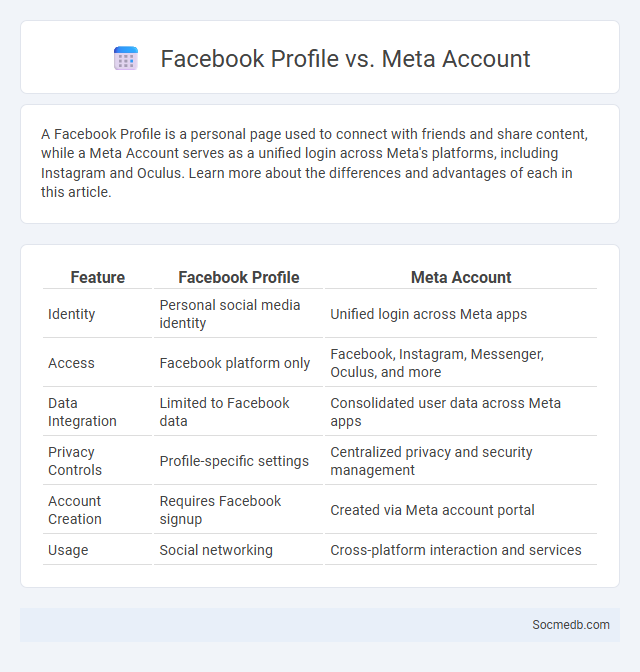
Photo illustration: Facebook Profile vs Meta Account
A Facebook Profile is a personal page used to connect with friends and share content, while a Meta Account serves as a unified login across Meta's platforms, including Instagram and Oculus. Learn more about the differences and advantages of each in this article.
Table of Comparison
| Feature | Facebook Profile | Meta Account |
|---|---|---|
| Identity | Personal social media identity | Unified login across Meta apps |
| Access | Facebook platform only | Facebook, Instagram, Messenger, Oculus, and more |
| Data Integration | Limited to Facebook data | Consolidated user data across Meta apps |
| Privacy Controls | Profile-specific settings | Centralized privacy and security management |
| Account Creation | Requires Facebook signup | Created via Meta account portal |
| Usage | Social networking | Cross-platform interaction and services |
Understanding Facebook Profile
Facebook profiles serve as personalized digital identities containing user information, posts, photos, and connections. Understanding Facebook profiles involves analyzing privacy settings, friend lists, and activity logs to gauge user interactions and preferences. This insight aids in targeted marketing, social networking strategies, and enhancing online engagement.
What is a Meta Account?
A Meta Account is a unified login system created by Meta Platforms that allows you to access and manage multiple services like Facebook, Instagram, and Messenger using a single set of credentials. This account streamlines your social media experience by syncing profiles, preferences, and settings across Meta's apps, enhancing convenience and security. Managing your Meta Account ensures consistent identity verification and personalized interactions across the entire Meta ecosystem.
Defining the Term "Profile
A social media profile is a digital representation of your identity on platforms like Facebook, Instagram, or LinkedIn, encompassing personal information, photos, and interests. This profile serves as the central hub for your online interactions, enabling connections, content sharing, and community engagement. Managing your profile carefully ensures your online presence aligns with your personal or professional goals.
Key Differences Between Facebook Profile and Meta Account
Facebook Profile serves as an individual's personal identity on the platform, allowing users to share posts, photos, and connect with friends, while a Meta Account acts as a unified login credential across Meta's ecosystem, including Facebook, Instagram, and Oculus services. The Facebook Profile is visible to other users and customizable with personal information, privacy settings, and timelines, whereas the Meta Account primarily manages access, security settings, and billing information for multiple Meta applications. Understanding this distinction helps users navigate privacy controls and streamline their experience across interconnected Meta platforms.
Meta Account vs Profile: Core Distinctions
Meta Account serves as the overarching authentication system that enables users to access multiple Meta services such as Facebook, Instagram, and WhatsApp with a single login. In contrast, a Profile represents the personalized space within these platforms where users manage content, privacy settings, and interactions with friends or followers. Understanding the distinction is crucial for optimizing privacy controls, cross-platform activities, and overall user experience within the Meta ecosystem.
Features Exclusive to Facebook Profiles
Facebook profiles offer unique features such as the customizable intro section where You can highlight key information, life events that showcase important moments chronologically, and a detailed friends list to manage social connections. The platform supports photo and video albums with tagging options for personalized storytelling, as well as integrated accessibility tools for a broader audience reach. Exclusive options like profile frames, background themes, and personalized username URLs enhance Your profile's distinctiveness and online presence.
Privacy and Security: Facebook Profile vs Meta Account
Facebook profiles store personal information, including photos, contacts, and posts, which can be accessed and shared based on user privacy settings. Meta accounts integrate multiple services under one login, centralizing data but increasing exposure risk if security measures fail. Enhanced privacy controls and two-factor authentication are essential to protect user data across both Facebook profiles and Meta accounts.
Managing Multiple Profiles Under Meta
Managing multiple profiles under Meta allows you to efficiently oversee Facebook, Instagram, and Messenger accounts from a single dashboard, streamlining content scheduling and engagement tracking. Utilizing Meta Business Suite, you can access detailed analytics and performance metrics to optimize your social media strategy across all profiles. This centralized approach saves time and ensures consistent branding and messaging for your personal or business presence online.
Advantages of Using Meta Account Over Facebook Profile
Using a Meta account offers enhanced integration across multiple platforms like Instagram, WhatsApp, and Oculus, providing a seamless user experience while maintaining a single login. Your data synchronization and privacy controls are more centralized, allowing for easier management of settings and preferences. Meta's advanced algorithms optimize content delivery and ads personalization, giving you a more tailored social media environment compared to a standalone Facebook profile.
Choosing the Right Option: Facebook Profile, Meta Account, or Profile
Choosing the right option between a Facebook profile, Meta account, or profile depends on your social media goals and privacy needs. A Facebook profile is ideal for personal connections, while a Meta account offers integrated access to Facebook, Instagram, and WhatsApp, enhancing cross-platform experience. Understanding how each option manages your data and user experience helps you make an informed decision tailored to your online presence.
 socmedb.com
socmedb.com